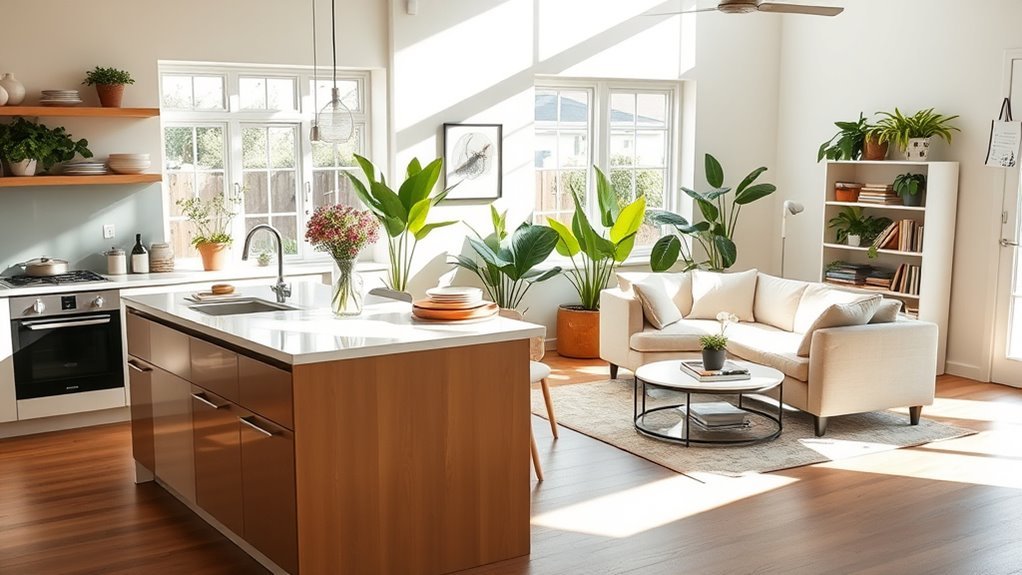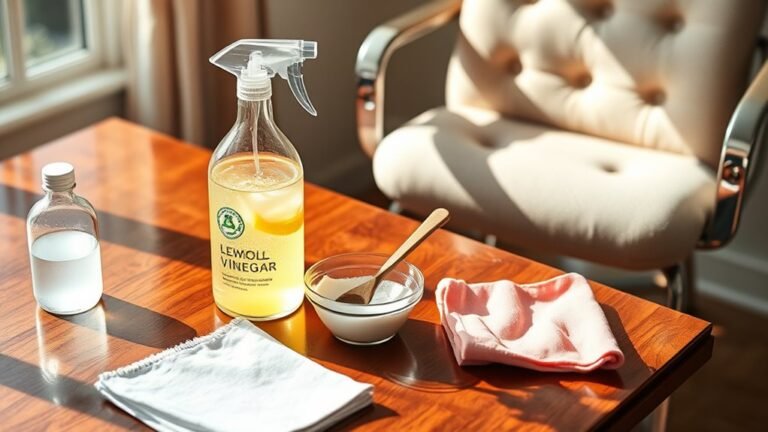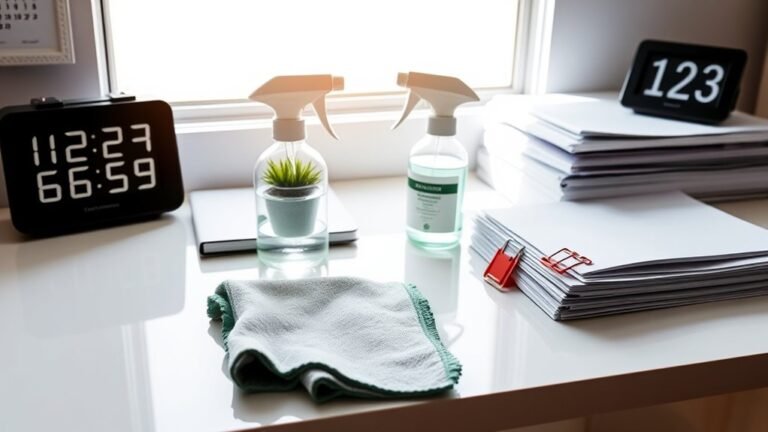How to Keep a Shared Co-Living Space Clean
To keep a shared co-living space clean, start by setting clear cleaning responsibilities so everyone knows their duties. Create a weekly schedule that rotates chores fairly, and communicate expectations openly to avoid misunderstandings. Keep cleaning supplies accessible and organized for quick use, and address messes promptly before they pile up. Using labels and storage helps maintain order, plus rotating deep cleaning tasks prevents burnout. Following these steps creates a respectful, tidy home—and there’s more you can do to keep things running smoothly.
Establish Clear Cleaning Responsibilities
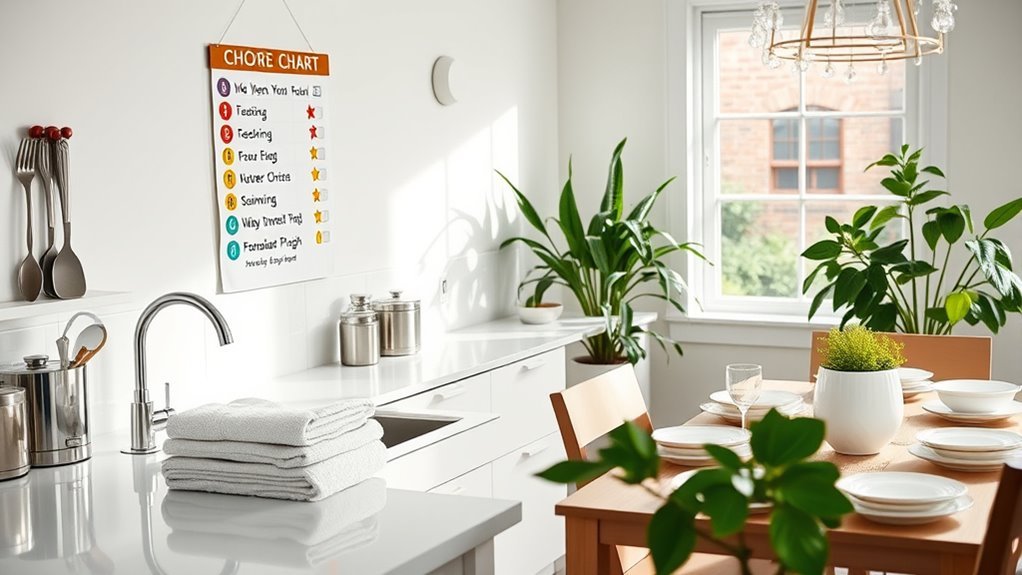
Before messes pile up, make sure everyone knows their cleaning duties. You’ll want to create clear cleaning agreements that everyone has agreed to, so no one feels stuck with unfair tasks. Get together and decide who’s responsible for what—whether it’s dishes, trash, or shared spaces. Using a responsibility chart can help keep things transparent and fair; it’s a simple way to visualize who handles each chore. This approach respects your freedom by preventing confusion and last-minute scrambles. When everyone’s clear on their role, your shared space stays neat without anyone feeling burdened. Establishing these boundaries early means you spend less time arguing and more time enjoying the freedom of a clean, comfortable home.
Develop a Weekly Cleaning Schedule
To keep things running smoothly, assign specific cleaning tasks to each person and rotate them weekly to keep it fair. Make sure everyone knows their deadlines so nothing gets overlooked. This way, the space stays clean without anyone feeling stuck with the same chores all the time.
Assign Specific Tasks
Although keeping a shared co-living space clean can feel overwhelming, assigning specific tasks through a weekly cleaning schedule makes it manageable for everyone. When you clearly delegate each chore—whether it’s wiping counters, vacuuming, or taking out the trash—you create a system that respects everyone’s time and freedom. Task delegation guarantees no one feels stuck doing everything, and it keeps the space tidy without constant nagging. Incorporate accountability measures by setting clear expectations and perhaps a simple check-in, so everyone knows their responsibilities matter. This way, you avoid confusion and build a cooperative vibe where cleaning doesn’t feel like a burden but a shared effort, letting you all enjoy a fresh, comfortable home with minimal hassle.
Rotate Responsibilities Weekly
Since everyone has different preferences and strengths when it comes to chores, rotating responsibilities weekly guarantees fairness and keeps things fresh. A cleaning rotation lets each person take turns handling various tasks, preventing burnout and promoting responsibility sharing among roommates. You’ll appreciate how this system encourages accountability without feeling stuck in one role. To set up a smooth cleaning rotation, consider:
- Listing all essential chores and dividing them evenly
- Scheduling weekly swaps to keep responsibilities balanced
- Encouraging open communication about preferences or conflicts
- Using a shared calendar or app to track assignments
Set Clear Deadlines
Once you’ve set up a rotation system, keeping everyone on track becomes easier when clear deadlines are in place. To maintain freedom without chaos, you need to set realistic expectations about when tasks should be completed. Develop a weekly cleaning schedule that outlines specific days for each responsibility, so no one feels overwhelmed or uncertain. This approach encourages teamwork, as everyone knows their role and timing, reducing last-minute scrambles. Communicate the schedule openly and adjust it if needed to fit everyone’s lifestyle. By setting firm but fair deadlines, you create a balanced environment where chores get done efficiently, leaving more time for the things you truly enjoy. Clear deadlines aren’t about control—they’re about freedom through shared accountability.
Communicate Expectations Openly
You’ll want to set clear cleaning rules so everyone knows what’s expected. Make time for regular check-ins to discuss how things are going and adjust as needed. Open communication helps prevent misunderstandings and keeps the space tidy.
Set Clear Cleaning Rules
Clear cleaning rules are the foundation of a tidy co-living space. You want freedom, but some structure helps everyone enjoy a clean environment without friction. Setting clear expectations through cleaning agreements prevents misunderstandings and makes conflict resolution smoother. When you openly communicate what’s expected, everyone knows their role.
Here’s what to include in your cleaning agreements:
- Define specific tasks and who’s responsible for each
- Set standards for cleanliness everyone agrees on
- Establish deadlines or frequency for chores
- Outline steps for resolving conflicts calmly
Schedule Regular Check-Ins
Although setting rules is essential, regularly checking in with your housemates keeps everyone accountable and allows you to address issues before they escalate. Make these check-ins casual but consistent, giving everyone space to share their thoughts on shared preferences. This open communication helps you all stay aligned and prevents resentment from building up. When conflicts arise, use these moments to practice conflict resolution calmly and fairly, ensuring everyone feels heard without judgment. By embracing regular conversations, you create a flexible environment where freedom and respect coexist. It’s not about strict control but about maintaining a clean, comfortable space that reflects everyone’s needs. Remember, shared living thrives on mutual understanding, so keep the dialogue flowing and the space welcoming.
Keep Cleaning Supplies Accessible
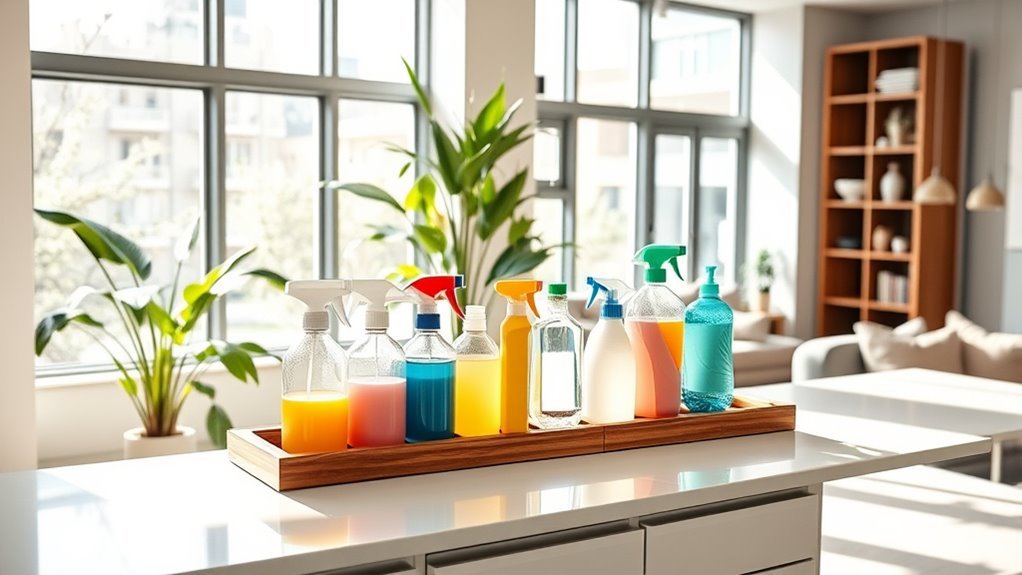
Since keeping your shared co-living space clean depends on everyone pitching in, having cleaning supplies within easy reach makes it more likely that chores get done promptly. When cleaning supplies are accessible, you and your roommates won’t hesitate to tackle messes in shared spaces right away, preserving freedom and comfort for all.
To keep things simple, consider these tips:
- Store essential cleaning supplies in a central, visible spot.
- Use labeled containers or caddies for quick grab-and-go access.
- Regularly restock items like sprays, wipes, and gloves.
- Choose multi-purpose products to minimize clutter.
Clean as You Go in Shared Areas
Having cleaning supplies within easy reach makes it easier to tidy up messes as they happen. When you adopt the habit of cleaning as you go in shared areas, you prevent clutter from piling up and keep the space inviting for everyone. Remember, your freedom in a co-living setup depends on mutual respect and shared responsibilities. By quickly wiping down counters, rinsing dishes right after use, and putting things back where they belong, you set a standard that encourages others to do the same. These small cleaning habits don’t take much time but make a huge impact on the overall cleanliness and harmony of your living environment. Embrace this approach—it’s a simple way to enjoy a cleaner, freer shared space every day.
Organize Personal and Common Belongings

To keep your shared space tidy, make sure everyone has designated storage areas for their belongings. Labeling personal items helps avoid confusion and keeps things organized. This simple step can make a big difference in maintaining order.
Designated Storage Areas
A well-organized shared space starts with designated storage areas that keep both personal and common belongings in order. You want to create a system where everyone feels free to access what they need without chaos or clutter. Using designated shelves and storage bins can transform your space into a tidy, stress-free environment. Here’s how to make it work:
- Assign personal storage bins for each resident to keep their items contained.
- Use open designated shelves for communal items like books or kitchenware.
- Choose stackable or clear storage bins to maximize space and visibility.
- Encourage regular tidying to maintain the order and respect everyone’s freedom.
Label Personal Items
Once you’ve set up designated storage areas, labeling personal items helps keep things even more organized and prevents mix-ups. Using clear labeling systems respects everyone’s personal space while making it easy to find what you need without hassle. You can freely access common belongings without confusion, keeping the vibe relaxed and cooperative.
Here’s a simple labeling system you can try:
| Item Type | Label Example |
|---|---|
| Personal Towels | “Alex – Towels” |
| Food Containers | “Jamie – Snacks” |
| Cleaning Supplies | “Shared – Cleaning” |
| Electronics | “Sam – Chargers” |
| Books | “Lara – Reading” |
This approach promotes freedom by reducing disputes and keeping your co-living space smooth and enjoyable.
Address Messes Promptly
When messes happen, tackling them right away prevents dirt and clutter from piling up and becoming overwhelming. You want to enjoy your space freely, not feel trapped by messy situations. Developing clean habits means you don’t let small spills or clutter linger. Instead, you take action immediately, keeping the environment fresh and inviting.
To address messes promptly, try these tips:
- Carry cleaning supplies for quick access.
- Wipe spills as soon as they occur.
- Encourage housemates to clean up after themselves.
- Set reminders for daily tidying routines.
Use Labels and Storage Solutions
Keeping messes under control is just one part of maintaining a clean co-living space. To keep things organized without feeling restricted, you’ll want to rely on smart labeling systems and practical storage bins. Labels help everyone quickly identify where items belong, cutting down on confusion and misplaced belongings. Choose clear, simple labels that everyone agrees on to maintain harmony. Storage bins keep your shared space clutter-free by giving each item a designated spot. Opt for stackable bins or those that fit neatly on shelves to maximize space. When things have their place and are clearly marked, cleaning becomes easier and less of a chore. This way, you enjoy your freedom without sacrificing order or cleanliness in your shared home.
Rotate Deep Cleaning Tasks
Although regular tidying helps maintain a clean co-living space, deep cleaning tasks require extra effort and attention. To keep things fair and avoid burnout, it’s crucial to set up a cleaning rotation that shares these responsibilities evenly. This way, everyone enjoys a fresh environment without feeling stuck with the toughest chores.
Sharing deep cleaning duties fairly prevents burnout and keeps your co-living space fresh and enjoyable for all.
Here’s how you can rotate deep cleaning tasks effectively:
- List all deep cleaning duties, like scrubbing appliances or cleaning windows
- Assign tasks on a weekly or monthly schedule
- Swap roles regularly to guarantee task fairness
- Track completed tasks to keep everyone accountable
Foster a Respectful Cleaning Culture
Since everyone shares the space, fostering a respectful cleaning culture is essential to guarantee cooperation and harmony. You’ll want to agree on cleaning etiquette that respects each person’s time and freedom while maintaining mutual respect. Open communication helps prevent misunderstandings and keeps everyone accountable. Establish clear expectations but stay flexible to accommodate different routines. Here’s a quick guide to help you visualize respectful cleaning habits:
| Task | Frequency | Responsible Person |
|---|---|---|
| Kitchen wipe | Daily | Rotating |
| Trash disposal | Every 2 days | Assigned |
| Vacuuming | Weekly | Volunteer |
| Bathroom clean | Twice a week | Rotating |
| Shared spaces | As needed | Everyone |
Keep this culture alive, and your co-living space will feel free and fresh for all.
Frequently Asked Questions
How Can Technology Help Manage Cleaning Tasks in Co-Living Spaces?
When it comes to managing cleaning tasks, technology can be a game changer, letting you keep things running like clockwork. You can set up digital cleaning schedules that everyone can access, so no one’s left holding the bag. Task reminders ping you at just the right time, freeing you from mental clutter and letting you enjoy your space without worry. It’s all about working smarter, not harder, so you get more freedom and less fuss.
What Are Eco-Friendly Cleaning Products Suitable for Shared Homes?
If you want to keep your shared home fresh without harming the planet, you’ll love eco friendly alternatives like vinegar, baking soda, and lemon juice—they’re natural cleaners that work wonders. These ingredients are safe, affordable, and free from harsh chemicals, giving you freedom from toxins while keeping your space spotless. Plus, they’re easy to find and use, so you can maintain a clean, healthy environment without any hassle or guilt.
How to Handle Cleaning Disputes Without Causing Conflicts?
When cleaning disputes pop up, you’ll want to stay calm and focus on conflict resolution. Setting clear cleaning schedules together helps everyone know what’s expected, reducing tension. Keep communication open—listen and share your concerns honestly without blame. Remember, you’re all aiming for a comfortable space, so compromise and flexibility go a long way. This way, you can enjoy your freedom without letting cleaning conflicts take over your vibe.
What Are the Best Practices for Pet-Related Cleaning in Shared Spaces?
Keep pet grooming regular, keep odor control consistent, keep cleaning supplies handy. You’ll want to groom your pet often to minimize shedding and dander. You’ll want to use odor control products like air purifiers or natural sprays to keep the space fresh. You’ll want to clean up accidents immediately and designate specific pet areas to respect everyone’s freedom. By doing these, you’ll enjoy your pet and your shared space without hassle.
How to Maintain Hygiene in Shared Bathrooms Effectively?
To keep shared bathrooms hygienic, start by setting up bathroom schedules so everyone knows when it’s their turn to clean. Use cleaning checklists to make sure no spot gets missed, from sinks to toilets to floors. This way, you’re not stuck doing all the work, and everyone shares responsibility. You’ll enjoy a fresh space without the hassle, giving you more freedom to relax and live comfortably.
